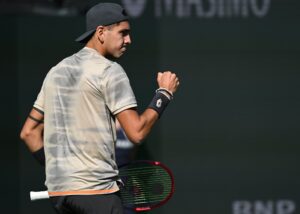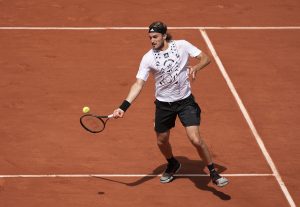The list of great tennis films, both fictional and non-fiction, is depressingly small. Indeed, it may be the smallest for any major sport. Perhaps it is the sheer difficulty of replicating tennis on screen (it is far easier to recreate a goal, a try or a putt than a serve or especially a rally) that has prevented it from being fully realised in fictional form, and so it is probably tennis documentaries that best capture the truth and beauty of the greatest individual sport. Now another great tennis documentary, In The Realm Of Perfection, exists alongside classics such as the BBC’s Arthur Ashe: More Than A Champion, and it tells the remarkable story of the man who was the absolute opposite of the calm and magisterial Ashe, John McEnroe.
The first thing to say about In The Realm Of Perfection (the original French title of which is L’empire de la perfection) is that in many ways it is more comparable to Claude Debussy’s ballet, Jeux (Games), than it is to most conventional tennis films or documentaries. That is because in its first half especially it is at times extraordinarily abstract rather than purely representational. Just as Debussy used the idea of a tennis match at dusk as the starting point for some of his greatest and typically impressionistic music, so the director of In The Realm Of Perfection, Julien Faraut, shows very little actual tennis for much of the film, or at least tennis as it is usually conceived of and portrayed, namely as a game played by two people, rather than one.
That is because Faraut’s film is really the story of another film, or rather series of films, made by an earlier French director, Gil de Kermadec. De Karmadec spent much of the early 1980s both filming McEnroe at Roland Garros obsessively, to the point that he focused almost exclusively on McEnroe and filmed little of his actual opponents, and making educational and training films for the French tennis federation that explained the basics of tennis to a non-tennis fan. Thus it is that extreme close-up photography of McEnroe is combined and intercut with simple (almost simplistic) animation explaining the scoring system of tennis. And as the narrator of the film (the great French actor, Mathieu Amalric) wryly points out, de Kermadec studies McEnroe almost anthropologically, or as a naturalist might study penguins in the arctic, rather than as someone especially interested in sport and sportspeople.
Nevertheless, In The Realm Of Perfection is a beautifully evocative, even poetic reminder of the genius and tragedy (in sporting terms) of John McEnroe. The almost exclusive concentration on him captures the most astonishing aspects of his game: the incredible anticipation of his opponent’s shots; the graceful movement around the court; and above all the sublime volleying, which is probably the greatest of any tennis player ever. However, the focus on McEnroe also shows, unflinchingly, the sheer petulance of the man (man-child would be more accurate) as he berates himself, scowls at umpires and officials, and completely fails to smile at any point during the entire film. Indeed, by the halfway point of In The Realm Of Perfection, even the most dedicated Mac fan will be feeling at least irritated and at worst furious at his apparently ceaseless criticism of himself and anyone else within earshot.
However, it is then that the film plays its trump card, which is simply to show some actual tennis, and some of the greatest tennis ever played at that. The final third of the film is dedicated to the 1984 French Open final between McEnroe and his nemesis at the time, Ivan Lendl, who, with his steely self-possession and far more mechanical playing style, was the absolute antithesis of McEnroe the boy-genius. Having laid the groundwork during its first half, the film now really takes off as it shows McEnroe playing the best tennis that he ever played, in the process making even another great player like Lendl look completely flat-footed by comparison.
Of course, McEnroe did not actually win the French Open in 1984, or indeed ever. In The Realm Of Perfection beautifully captures the moment at the start of the final’s third set–when he finally stopped being the embodiment of tennis perfection and instead became the spoiled, narcissistic, self-defeating brat that he was at his worst. A few errors on his part, combined with a few more on the part of the officials (at least in his eyes), and suddenly the whole momentum of the final switched. Lendl was able to fight back and ultimately triumphed. This is undoubtedly the finest part of the film, and the drama is only added to by the use of a digital clock that marks the passing of the sets and the hours, until the grand finale.
In The Realm Of Perfection is a great tennis documentary. In fact, the first half especially might appeal more to tennis fans (even tennis nerds) than to non-tennis fans. But it is the ending of the film that ultimately makes it transcendent, such that it rises above the realm of sporting documentary and becomes truly and beautifully cinematic. Without giving away any spoilers, the film concludes with a consideration of whether McEnroe’s perfectionism was really worth it, particularly when it was combined with such appalling petulance. The very last image of the film shows triumphantly that it was, which is why McEnroe is still remembered as one of the tennis gods and not as the irritating infant that he also was for much of his career.
Main Photo:
Embed from Getty Images






